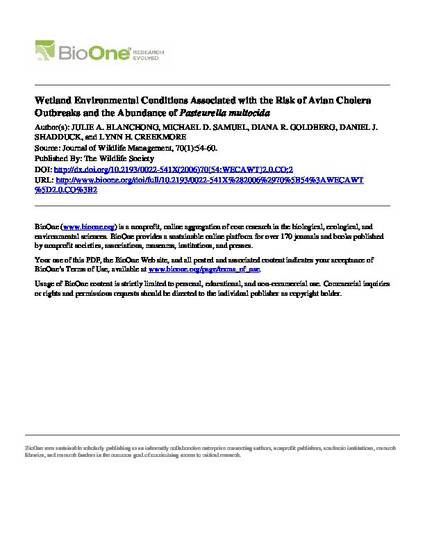
Avian cholera is a significant infectious disease affecting waterfowl across North America and occurs worldwide among various avian species. Despite the importance of this disease, little is known about the factors that cause avian cholera outbreaks and what management strategies might be used to reduce disease mortality. Previous studies indicated that wetland water conditions may affect survival and transmission of Pasteurella multocida, the agent that causes avian cholera. These studies hypothesized that water conditions affect the likelihood that avian cholera outbreaks will occur in specific wetlands. To test these predictions, we collected data from avian cholera outbreak and non-outbreak (control) wetlands throughout North America (winter–spring 1995–1996 to 1998–1999) to evaluate whether water conditions were associated with outbreaks. Conditional logistic regression analysis on paired outbreak and non-outbreak wetlands indicated no significant association between water conditions and the risk of avian cholera outbreaks. For wetlands where avian cholera outbreaks occurred, linear regression showed that increased eutrophic nutrient concentrations (Potassium [K], nitrate [NO3 ], phosphorus [P], and phosphate [PO3 ]) were positively related to the abundance of P. multocida recovered from water and sediment samples. Wetland protein concentration and an El Nin˜o event were also associated with P. multocida abundance. Our results indicate that wetland water conditions are not strongly associated with the risk of avian cholera outbreaks; however, some variables may play a role in the abundance of P. multocida bacteria and might be important in reducing the severity of avian cholera outbreaks.
Available at: http://works.bepress.com/julie_blanchong/7/

This article is from Journal of Wildlife Management 70 (2006): 54, doi:10.2193/0022-541X(2006)70[54:WECAWT]2.0.CO;2.